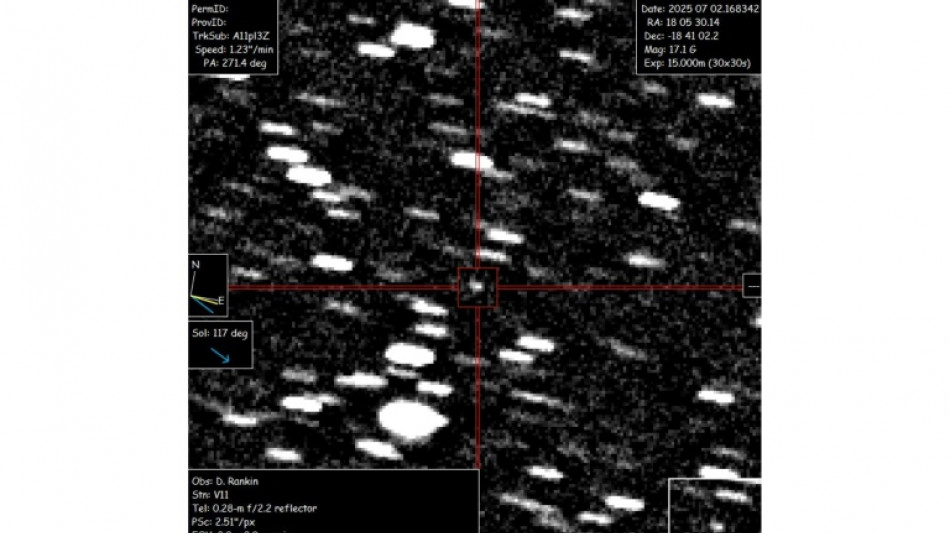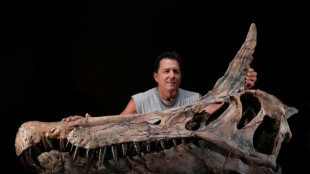
-
 OpenAI strikes Pentagon deal with 'safeguards' as Trump dumps Anthropic
OpenAI strikes Pentagon deal with 'safeguards' as Trump dumps Anthropic
-
Oscar-nominated 'F1' sound engineers recreate roar of racetrack

-
 15 dead as cash-packed military plane crashes in Bolivia
15 dead as cash-packed military plane crashes in Bolivia
-
Costa Rica's Grynspan pledges reform in bid for UN chief job

-
 Former All Black Bridge hailed for influence at Western Force
Former All Black Bridge hailed for influence at Western Force
-
'Sinners' vampires inspired by animals, says Oscar hopeful makeup artist

-
 For Oscar nominee Stellan Skarsgard, good cinema is like slow food
For Oscar nominee Stellan Skarsgard, good cinema is like slow food
-
'Brilliant industry' sees Reds down Highlanders in Super Rugby

-
 Neil Sedaka, US singer and songwriter, dies age 86
Neil Sedaka, US singer and songwriter, dies age 86
-
Paramount acquires Warner Bros. in $110 bn mega-merger

-
 Rosenior eyes extended stay to stabilise Chelsea
Rosenior eyes extended stay to stabilise Chelsea
-
Spurs struggling physically admits Tudor

-
 Lens held by Strasbourg in blow to Ligue 1 title chances
Lens held by Strasbourg in blow to Ligue 1 title chances
-
NFL salary cap passes $300 mn for first time

-
 Wolves secure rare win to dent Villa's bid for Champions League place
Wolves secure rare win to dent Villa's bid for Champions League place
-
Oil prices jump on Iran attack fears while US stocks fall

-
 Two dead, dozens injured as tram derails in Milan
Two dead, dozens injured as tram derails in Milan
-
Trump tells US govt to 'immediately' stop using Anthropic AI tech

-
 Court orders Greenpeace to pay $345 mn to US oil pipeline company
Court orders Greenpeace to pay $345 mn to US oil pipeline company
-
IAEA stresses 'urgency' to verify Iran's nuclear material

-
 UN urges action to prevent full civil war in South Sudan
UN urges action to prevent full civil war in South Sudan
-
Hackers steal medical details of 15 million in France

-
 Susan Sarandon praises Spain’s stance on Gaza
Susan Sarandon praises Spain’s stance on Gaza
-
Murray adamant size isn't everything despite losing Wales place

-
 Messi knocked down by fan in Puerto Rico pitch invasion
Messi knocked down by fan in Puerto Rico pitch invasion
-
Two killed, dozens injured as tram derails in Milan

-
 O'Neill taken aback by Rangers boss Rohl's comments on Celtic
O'Neill taken aback by Rangers boss Rohl's comments on Celtic
-
Ukrainian, Slovak leaders hold call amid energy spat

-
 French hard-left firebrand sparks row with 'antisemitic' Epstein jibe
French hard-left firebrand sparks row with 'antisemitic' Epstein jibe
-
Ahmed, Jacks blast England to thrilling win over New Zealand

-
 UK police arrest man after Churchill statue sprayed with graffiti
UK police arrest man after Churchill statue sprayed with graffiti
-
Bill Clinton denies wrongdoing at grilling on Epstein ties

-
 Red Cross urges Afghanistan-Pakistan 'de-escalation'
Red Cross urges Afghanistan-Pakistan 'de-escalation'
-
Coup role revelations revive calls for return of Spain's ex king

-
 Oil prices jump on Iran attack fears, Wall Street slips on AI
Oil prices jump on Iran attack fears, Wall Street slips on AI
-
TikTok disinformation: the other weapon in Mexico violence

-
 Carmaker BMW to trial humanoid robots at German factory
Carmaker BMW to trial humanoid robots at German factory
-
NASA announces overhaul of Artemis lunar program amid technical delays

-
 Golfer Pavan undergoes surgery after freak lift fall
Golfer Pavan undergoes surgery after freak lift fall
-
Bill Clinton faces grilling on extensive ties to Epstein

-
 For Roberto Cavalli designer, dreams come in all black
For Roberto Cavalli designer, dreams come in all black
-
Macron to set out how France's nuclear arms could protect Europe

-
 Spin-heavy England restrict New Zealand to 159-7 in Super Eights
Spin-heavy England restrict New Zealand to 159-7 in Super Eights
-
Starmer vows to fight 'extremes' after UK Labour election drubbing

-
 New Pokemon titles on horizon as 30th anniversary approaches
New Pokemon titles on horizon as 30th anniversary approaches
-
Arteta backs Gyokeres to impact Arsenal's trophy charge

-
 55 Ghanaians killed after being lured into Ukraine war: govt
55 Ghanaians killed after being lured into Ukraine war: govt
-
OpenAI raises $110 bn in record funding round

-
 Medvedev swats Auger-Aliassime aside to reach Dubai final
Medvedev swats Auger-Aliassime aside to reach Dubai final
-
Stocks slide, oil jumps tracking AI and Iran


Third-ever confirmed interstellar object blazing through Solar System
Astronomers on Wednesday confirmed the discovery of an interstellar object racing through our Solar System -- only the third ever spotted, though scientists suspect many more may slip past unnoticed.
The visitor from the stars, designated 3I/Atlas by the International Astronomical Union's Minor Planet Center, is likely the largest yet detected. It has been classified as a comet.
"The fact that we see some fuzziness suggests that it is mostly ice rather than mostly rock," Jonathan McDowell, an astronomer at the Harvard-Smithsonian Center for Astrophysics, told AFP.
Originally known as A11pl3Z before it was confirmed to be of interstellar origin, the object poses no threat to Earth, said Richard Moissl, head of planetary defense at the European Space Agency.
"It will fly deep through the Solar System, passing just inside the orbit of Mars," but will not hit our neighboring planet, he told AFP.
Excited astronomers are still refining their calculations, but the object appears to be zooming more than 60 kilometres (37 miles) a second.
This would mean it is not bound by the Sun's orbit, unlike those asteroids and comets that remain within the solar system.
Its trajectory also "means it's not orbiting our star, but coming from interstellar space and flying off to there again," Moissl said.
"We think that probably these little ice balls get formed associated with star systems," added McDowell. "And then as another star passes by, tugs on the ice ball, frees it out. It goes rogue, wanders through the galaxy, and now this one is just passing us."
The NASA-funded ATLAS survey in Hawaii first discovered the object on Tuesday, US astronomer David Rankin wrote on the social media platform Bluesky.
Professional and amateur astronomers across the world then searched through past telescope data, tracing its trajectory back to at least June 14.
The object is currently estimated to be roughly 10-20 kilometers wide, Moissl said, which would make it the largest interstellar interloper ever detected. But the object could be smaller if it is made out of ice, which reflects more light.
"It will get brighter and closer to the Sun until late October and then still be observable (by telescope) until next year," Moissl said.
- Our third visitor -
This marks only the third time humanity has detected an object entering the solar system from the stars.
The first, 'Oumuamua, was discovered in 2017. It was so strange that at least one prominent scientist became convinced it was an alien vessel -- though this has since been dismissed by further research.
Our second interstellar visitor, 2I/Borisov, was spotted in 2019.
Mark Norris, an astronomer at the UK's University of Central Lancashire, told AFP that the new object appears to be "moving considerably faster than the other two extrasolar objects that we previously discovered."
The object is currently roughly around the distance from Jupiter away from Earth, Norris said.
He lamented that he would not be able to observe the object on his telescope on Wednesday night, because it is currently only visible in the Southern Hemisphere.
Norris pointed to modelling estimating that there could be as many as 10,000 interstellar objects drifting through the Solar System at any given time, though most would be smaller than the newly discovered object.
If true, this suggests that the newly online Vera C. Rubin Observatory in Chile could soon be finding these dim interstellar visitors every month, Norris said.
Moissl said it is not feasible to send a mission into space to intercept the new object.
Still, these visitors offer scientists a rare chance to study something outside of our Solar System.
For example, if we detected precursors of life such as amino acids on such an object, it would give us "a lot more confidence that the conditions for life exist in other star systems," Norris said.
P.Costa--AMWN

